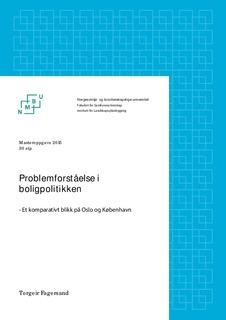| dc.contributor.author | Fagersand, Torgeir | |
| dc.date.accessioned | 2016-02-15T11:34:19Z | |
| dc.date.available | 2016-02-15T11:34:19Z | |
| dc.date.issued | 2016-02-15 | |
| dc.identifier.uri | http://hdl.handle.net/11250/2379071 | |
| dc.description.abstract | I denne masteroppgaven har fokus blitt rettet mot boligens funksjon i byen og hvordan enn idag ser på boligen som en del av byutviklingen. Intensjonen for oppgaven har vært å se på hvilken problemforståelse enn har rundt dagens boligpolitikk i Oslo. For å finne ut av dette har enn sett nærmere på teori som gir ulike betraktninger rundt boligen, samt en histoirsk gjennomgang av boligpolitikkens organisering og fremvekst. Oppgaven har og et komparativt tilsnitt da København er og under lupen, som kan sette Oslos politikk i et bredere perspektiv. Utifra en historiske data og dokumentanalyser av dagens førende politikk vil dette legge grunnlaget for oppgavens konklusjoner. Begge byene har gjennomgått nogenlunde like historiske perioder, fra en gryende industrialisering, fremveksten av velferdssamfunnet til dagens kunnskapssamfunn. Dette har gitt ulike boligbehov og planleggingen har etterfulgt dette. Men institusjonene vedrørende boligen er vidt forskjellige og har gitt forskjeller ved byenes boligpolitikk som enn ser idag. Dette samt fra den historiske gjennomgangen der enn kan se øst/vest skille i Oslo preger byen mer enn de sosioøkonomiske skillene i København. Mulighetsrommet med tanke på de institusjonelle virkemidlene er og større i København som igjen gir byen større muligheter for boligpolitikken. I Oslo (og Norge for den saks skyld) er selveierpolitikken såpass sterk at dette er det førende elementet i boligsektoren. Utifra dataene samt teorien som ligger til grunn kan enn med utgangspunkt med forskjellene enn ser i Oslo og København si at Oslo problemforståelse av boligpolitikken innehar et mer materielt aspekt mens i København innehar det og et romlig aspekt. Dette grunnet det institusjonelle mulighetsrommet samt byens geografi. | nb_NO |
| dc.description.abstract | This MA thesis focuses on the function of housing in the city and how housing is seen in the context of urban planning and development. The purpose of the thesis is to illuminate how housing policy issues in present-day Oslo are understood. In order to map this, the thesis presents relevant housing theory and gives a historical survey of the development of housing policy and institutions. The thesis takes a comparative approach, using the housing situation and history of Copenhagen to put the situation in Oslo into a broader context. The thesis draws its conclusions from historical data and document analysis of today’s housing policies. Oslo and Copenhagen have experienced similar historical periods, ranging from a dawning industrialization, through the establishment of the social-democratic welfare society, to today’s knowledge economy. This has been the cause of similar housing and planning needs, but the differences in institutional arrangements for dealing with these have caused the present, differing housing profiles of the two cities. These institutional differences, and a marked historical east/west divide affects Oslo’s present-day housing profile more than the more mosaic socioeconomic groupings in Copenhagen do. Consequently, there is more space for action through institutional means in Copenhagen, giving that city a wider range of policy options. In Oslo – and Norway in general – the freeholder policy is strong enough to remain the basic and overriding element in the housing sector. Based on the examined data and theory, this thesis concludes that the difference in institutional space for action and socioeconomic geographic distribution has caused a materialist understanding of housing policy in Oslo, as opposed to a more spatial understanding in Copenhagen. | nb_NO |
| dc.language.iso | nob | nb_NO |
| dc.publisher | Norwegian University of Life Sciences, Ås | |
| dc.subject | Boligpolitikk | nb_NO |
| dc.title | Problemforståelse i boligpolitikken : et komparativt blikk på Oslo og København | nb_NO |
| dc.type | Master thesis | nb_NO |
| dc.subject.nsi | VDP::Social science: 200::Urbanism and physical planning: 230 | nb_NO |
| dc.subject.nsi | VDP::Social science: 200::Political science and organizational theory: 240::Public and private administration: 242 | nb_NO |
| dc.source.pagenumber | 100 | nb_NO |
| dc.description.localcode | M-BYREG | nb_NO |
